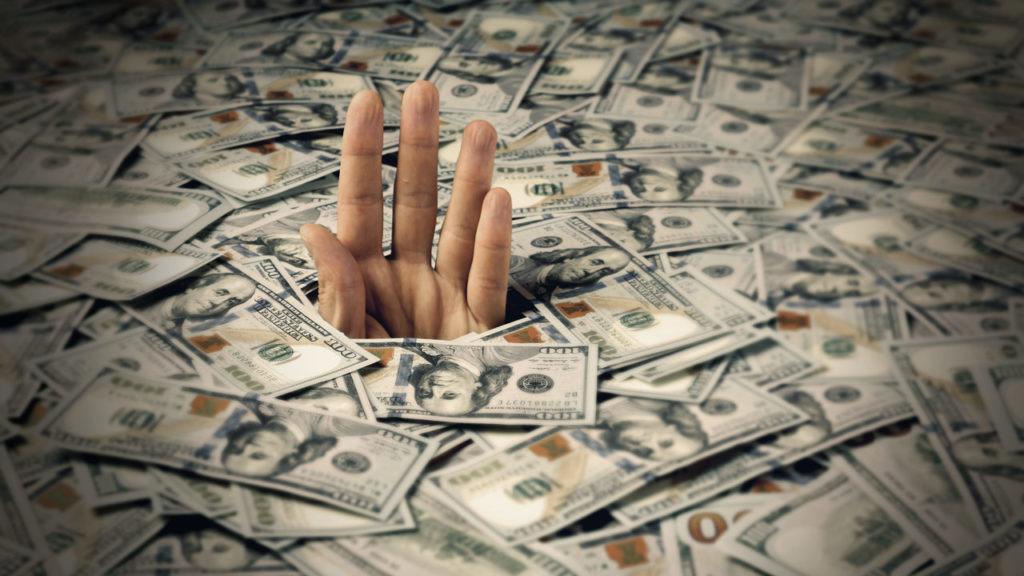The National Debt Doesn’t Matter?
The national debt stands at $30.3 trillion and the US government continues to run massive deficits. But does it really matter?
Some people say that it doesn’t because “we just owe the debt to ourselves.”
The real question, as framed by economist Murray Rothbard is who are “we” and “ourselves.”
Historian and libertarian commentator Tom Woods recently responded to an emailer making this argument.
The emailer said the government is “the ultimate higher up.” Therefore, the debt is only “on paper.”
So we borrow? How can you borrow from yourself in other words? The ‘debt’ as I see it is only on paper and has to be therefore fictitious, mentioned only for the people to sound important.”
But this simply isn’t true.
Stop and think about how the government finances the debt. It sells Treasury bonds. And it sells them to real people and institutions around the world.
If you hold Treasury bonds in your investment portfolio or 401K – and you probably do, the US government owes you money. If the government were to default, you would be out whatever you invested. Your loss would be very real – certainly not “fictitious.”
It would be no different than lending your neighbor $300 and never getting paid back.
And it’s not just Americans who buy Treasuries. Foreign investors own about 25% of the US debt. Again, these are real people and institutions who have lent money to the US government. They expect to be paid back. And they would suffer financial harm if they weren’t.
It is true that the government owes some of the debt to itself. For instance, the Social Security administration holds around $3 trillion in US debt. Other government agencies also hold Treasuries. But the largest holders of debt are American citizens and private institutions. US investors own about $10 trillion in US debt. Those people did not loan money to themselves.
I think people get confused when they conflate the US government with the American people. They are two distinct entities. You are not the government. And the government isn’t you.
So, the national debt isn’t some kind of fiction.
And even if there is no danger of default, the debt has real economic consequences. It puts a big drag on the US economy. Studies have shown that a debt to GDP ratio of over 90% retards economic growth by about 30%.
Some people will argue the US has been running massive deficits for decades. Nothing bad has happened, so, it must not be a big deal. This seems plausible. But you have to remember that when you kick the can down the road, you eventually run out of road. At some point, there is a tipping point when the debt will become so large that it will be impossible to maintain.
That’s going to be a problem. And not a fictitious one.





 Cocoa prices have dumped since rocketing to a dramatic peak last month as an El Nino cycle winds down and traders rush out of the illiquid market. For now, depreciating fiat currencies are still keeping the cocoa price still far above its 2023 levels. Coffee has had a similar rise and subsequent correction — but now, inflation and other factors are conspiring to […]
Cocoa prices have dumped since rocketing to a dramatic peak last month as an El Nino cycle winds down and traders rush out of the illiquid market. For now, depreciating fiat currencies are still keeping the cocoa price still far above its 2023 levels. Coffee has had a similar rise and subsequent correction — but now, inflation and other factors are conspiring to […] California’s government bet that they knew better than the free market. And now millions are paying the price. The story begins in 1919, when the city of Berkley, California instituted legislation setting aside districts that would only allow the construction of single-family housing. The idea spread, and soon much of California’s urban areas had adopted the zoning policy. Today, approximately 40% of the total land in Los Angeles is […]
California’s government bet that they knew better than the free market. And now millions are paying the price. The story begins in 1919, when the city of Berkley, California instituted legislation setting aside districts that would only allow the construction of single-family housing. The idea spread, and soon much of California’s urban areas had adopted the zoning policy. Today, approximately 40% of the total land in Los Angeles is […] The yen was once known as a safe-haven currency for investors to protect themselves when broader markets are shaky or other currencies are dropping, but those days are numbered. A stable government and consistent (and low) interest rates have been some of the driving factors, but it’s the unwinding of that ultra-low interest rate policy that will be the yen’s “safe […]
The yen was once known as a safe-haven currency for investors to protect themselves when broader markets are shaky or other currencies are dropping, but those days are numbered. A stable government and consistent (and low) interest rates have been some of the driving factors, but it’s the unwinding of that ultra-low interest rate policy that will be the yen’s “safe […] Whenever an election year rolls around, domestic manufacturing becomes a more central theme of discussion. Candidates from both sides, who seem to disagree on almost everything else, never waver in their commitment to auto manufacturers in Detroit and the steel industry. Republicans and Democrats never forget to remind the American public that they will try […]
Whenever an election year rolls around, domestic manufacturing becomes a more central theme of discussion. Candidates from both sides, who seem to disagree on almost everything else, never waver in their commitment to auto manufacturers in Detroit and the steel industry. Republicans and Democrats never forget to remind the American public that they will try […] The wizards at the Fed and US Treasury have been forced to acknowledge that their “transitory,” inflation is, in fact, quite “sticky.” And with the inflation elephant now acknowledged by the circus of high finance, Treasury yields keep inching up, recently reaching 4.7% — the highest since November. The Fed is stuck: It needs to raise interest rates to tame inflation and […]
The wizards at the Fed and US Treasury have been forced to acknowledge that their “transitory,” inflation is, in fact, quite “sticky.” And with the inflation elephant now acknowledged by the circus of high finance, Treasury yields keep inching up, recently reaching 4.7% — the highest since November. The Fed is stuck: It needs to raise interest rates to tame inflation and […]